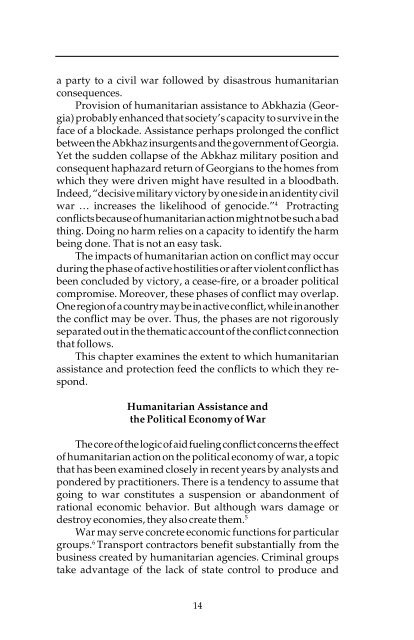Brown Cover OP 43 - The Watson Institute for International Studies
Brown Cover OP 43 - The Watson Institute for International Studies
Brown Cover OP 43 - The Watson Institute for International Studies
Create successful ePaper yourself
Turn your PDF publications into a flip-book with our unique Google optimized e-Paper software.
a party to a civil war followed by disastrous humanitarian<br />
consequences.<br />
Provision of humanitarian assistance to Abkhazia (Georgia)<br />
probably enhanced that society’s capacity to survive in the<br />
face of a blockade. Assistance perhaps prolonged the conflict<br />
between the Abkhaz insurgents and the government of Georgia.<br />
Yet the sudden collapse of the Abkhaz military position and<br />
consequent haphazard return of Georgians to the homes from<br />
which they were driven might have resulted in a bloodbath.<br />
Indeed, “decisive military victory by one side in an identity civil<br />
war … increases the likelihood of genocide.” 4 Protracting<br />
conflicts because of humanitarian action might not be such a bad<br />
thing. Doing no harm relies on a capacity to identify the harm<br />
being done. That is not an easy task.<br />
<strong>The</strong> impacts of humanitarian action on conflict may occur<br />
during the phase of active hostilities or after violent conflict has<br />
been concluded by victory, a cease-fire, or a broader political<br />
compromise. Moreover, these phases of conflict may overlap.<br />
One region of a country may be in active conflict, while in another<br />
the conflict may be over. Thus, the phases are not rigorously<br />
separated out in the thematic account of the conflict connection<br />
that follows.<br />
This chapter examines the extent to which humanitarian<br />
assistance and protection feed the conflicts to which they respond.<br />
Humanitarian Assistance and<br />
the Political Economy of War<br />
<strong>The</strong> core of the logic of aid fueling conflict concerns the effect<br />
of humanitarian action on the political economy of war, a topic<br />
that has been examined closely in recent years by analysts and<br />
pondered by practitioners. <strong>The</strong>re is a tendency to assume that<br />
going to war constitutes a suspension or abandonment of<br />
rational economic behavior. But although wars damage or<br />
destroy economies, they also create them. 5<br />
War may serve concrete economic functions <strong>for</strong> particular<br />
groups. 6 Transport contractors benefit substantially from the<br />
business created by humanitarian agencies. Criminal groups<br />
take advantage of the lack of state control to produce and<br />
14

















